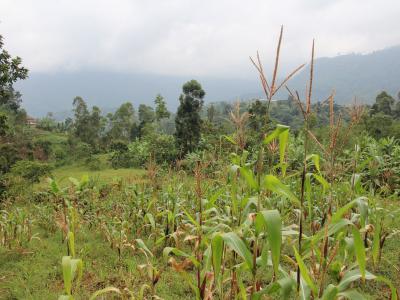FAO, UNDP and Uganda Government launch project to integrate agriculture in National Adaptation Plan

Kampala, 2nd August, 2016 - The Food and Agriculture Organization of the United Nations (FAO) and the United Nations Development Programme (UNDP) partnered with the Ugandan Government to integrate the agriculture sector – including crops, livestock, forestry, fisheries and aquaculture - in the National Adaptation Plan (NAP) process. This is because agriculture is particularly vulnerable to climate change due to extensive reliance on rainfall, high seasonal climate variability, recurrent drought and floods and persistent poverty that limits capacity to adapt.
The National Adaptation Plan (NAP) process was initiated in 2010 to address medium and long term adaptation needs for all developing countries under the United Nations Framework Convention on Climate Change (UNFCCC). The objectives of the NAPs are to reduce vulnerability to the impact of climate change by building adaptive capacity and resilience and to facilitate the integration of climate change adaptation into fiscal, regulatory and development policies, programs and activities.
Uganda will benefit from a four-year technical assistance programme of USD 700,000 for its work plan activities, in addition to global expertise on mainstreaming climate change into planning and budgeting, economics of adaptation, impact assessment and gender for activities over the period 2016-2018.
While launching the project in Mukono, the Minister for Agriculture, Animal Industry and Fisheries, Honourable Vincent Ssempijja, said that agriculture is a central part of Uganda’s continued growth, accounting for 24% of GDP and directly employing over 65% of the total population.
He further noted that climate change poses serious and adverse challenges to the environment, the people of Uganda, and their livelihoods.
“The current rise in temperatures and the unreliable rainfall patterns have had significant impact on agricultural production and productivity. Combating these effects in the agriculture sector requires collective efforts through collaboration and partnership at different levels,“ said the Minister, adding that climate change knows no boundaries and no single institution can handle it alone.
Speaking during the project inception workshop on behalf of FAO and UNDP, the FAO Uganda Country Representative, Alhaji Jallow, said that the NAP process is an important step in addressing disastrous climate change impacts on agriculture and food security in general.
“With growing climate change challenges, every nation ought to take actions to address them to reduce food insecurity and poverty. For this, we salute the government of Uganda for prioritizing response to climate change,” he said.
Nearly 75 per cent of the world’s food insecure and poor people rely on agriculture and natural resources for their livelihoods. Agriculture sectors are particularly exposed to the effects of climate change and increased climate variability. Uganda’s agriculture heavily relies on rainfall; whose pattern has not been spared by climate change.
While most African countries have the smallest contribution to the emission of greenhouse gases, they are among the most threatened due to impact of climate change, especially on agriculture. Through various United Nations projects, Uganda has already integrated some of its climate change adaptation needs, including using various crop varieties, and adopting sustainable land management, especially in the arid and semi-arid areas through use of small and big water and irrigation systems
Speaking at the meeting, Honourable Lawrence Songa, Chairperson of the Parliamentary Forum on Climate Change, spoke on the role of parliament to support government meet its international obligations, and expressed the willingness of the Forum to participate in creating awareness and advocating for inclusion of adaptation in development plans.
Mr Chebet Maikut, Commissioner for Climate Change Department in the Ministry of Water and Environment, while speaking at the meeting, emphasized the need to implement relevant policies and frameworks to address climate change as an overall development challenge that, if not addressed, could affect Uganda’s development agenda.
The national adaptation plan process offers a major opportunity for countries to address climate change adaptation in the medium to long term. “Developing national capacity for mainstreaming climate into planning and budgeting, improving economic valuation and impact assessment of adaptation initiatives are at the core of the programme. The programme aims to increase collaboration between agriculture, environment, planning and finance ministries”, said Rohini Kohli, Lead Technical Specialist on national adaptation planning with the climate adaptation team at UNDP’s Global Environmental Finance Unit.
Through funding from the German Federal Ministry for the Environment, Nature Conservation, Building and Nuclear Safety (BMUB), the programme targets eight countries: Uganda, Kenya, Zambia, Philippines, Thailand, Uruguay, Vietnam and Nepal. The support will help vulnerable countries’ adaptation planning efforts. Four outcomes are envisaged in the programme to support the NAP process in the country, including strengthening technical capacities and institutions; developing integrated roadmaps; strengthening evidence-based decision making and promoting advocacy and knowledge-sharing.
Implementation of the project in Uganda will be supported by FAO and UNDP teams, in collaboration with the global technical team of the United Nations Development Programme and Food and Agriculture Organization of the United Nations.
The inception workshop attracted stakeholders from all the relevant ministries including Ministry of Agriculture, Animal Industry and Fisheries; Ministry of Water and Environment; UN agencies; Climate Change Department; Meteorological Department; research organizations; academic institutions and civil society organizations, among others.
For Further Details:
Agatha Ayebazibwe – Agatha.ayebazibwe@fao.org
Onesimus Muhwezi – Onesimus.muhwezi@undp.org